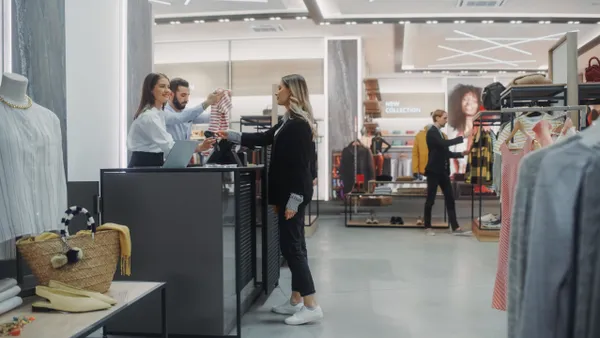NEW YORK — A new in-store strategy at Macy's is on prominent display at its Herald Square flagship in New York, where both The Market @ Macy's and b8ta concepts are placed just inside one of the entrances, at the intersection of 34th and 7th streets. Both installations came into being this year, the same year that Macy's acquired store concept Story, and invested in and partnered with b8ta.
The department store's most recent experiments sit alongside another shop-in-shop concept, a Samsung mini-store, and the three mark a departure from the usual in-store experience at Macy's. The move could be seen as a response to the perception that it has struggled to stand out from the pack in the past, resulting in shuttered stores and a turnaround that finally seems to be taking hold.
There weren't many customers exploring the two installations when Retail Dive was in the store, but both offered insights into what Macy's may hope its stores will become — in short, destinations for more than basic apparel and accessories.
The Market @ Macy's
Perhaps one of the most interesting things about The Market @ Macy's is the selection of products the department store pushes through the concept, which not only varies widely, but also seems more cause-oriented than the usual Macy's selection.
One table, as part of the Facebook holiday pop-up, included products from Love Your Melon, which just opened its first physical location and has become famous for its thick knitted hats, as well as for donating half of all profits to charity, and Two Blind Brothers, which donates all of its profits to find cures for blindness. In a similar vein, another section of the pop-up featured products from Honest Co., as well as 4ocean's environmental bracelets, which are made with recycled plastic and come with a promise to remove one pound of trash from the ocean with every purchase.
Cause-based retailing and marketing isn't unusual (it's arguably more popular now than in the past), but it is unusual at Macy's. Companies like Patagonia and REI have been at the forefront of the movement for years now. Patagonia stepped up its rhetoric with a challenge directed at President Donald Trump on national park policies and the launch of a site that connects activists with grassroots causes. Gap and Nike have also taken advantage of the political trend in marketing campaigns this year.
While guidance in the past has been to avoid sensitive or potentially partisan topics, multiple studies in the past year have found that large numbers of customers are actually interested in seeing retailers take a stand on social issues. Younger shoppers in particular are more interested in brands and retailers that are eco-friendly and socially responsible, which seems to be an aim of many of the products displayed at The Market @ Macy's. However, the pop-up features plenty of other niche products as well, fulfilling its mission for product discovery.
In November, there were a few makeup brands, a veggie spiralizer and two large-scale simulators — one which allowed customers to test drive a Ferrari and another that allowed shoppers to try out "sleep buds" from Bose. The plan for the shop-in-shop during the holidays is to rotate through 150 e-commerce brands, a change from the usual standard brand rotation at department stores.
Macy's newest store concept also takes cues from its recent beauty makeover, with Macy's employees running the kiosk rather than brand-specific employees, a lesson the department store learned from retailers like Sephora and Ulta. It also showcases some of the reasons Macy's acquired Story, and with it, Rachel Shechtman.
CEO Jeff Gennette told Retail Dive during an interview in November that Shechtman, now Macy's brand experience officer, had "hit the ground running" and while plans for how Story would be integrated were not disclosed, she has also been given other projects to work on for the department store, signaling a larger role for experiential retail at the department store.
"She's in a real good nexus to really focus on experience, experience in stores, experience online," Gennette said, "and Story is going to be one plank of that story, one chapter."
B8ta
The b8ta shop-in-shop at Herald Square follows a model reminiscent The Market @ Macy's. It, too, features brand-agnostic b8ta employees who wander the space, ready to assist any customers with questions about the tech-y products on display. And b8ta offers a similar range of niche items.
A short walkthrough of the space revealed a smart mirror, a robot and a digital canvas for displaying photos, as well as supplements, a pillow from GhostBed, an indoor smart garden and a whole table of tech-based toys and gadgets aimed toward kids. The main attraction was a group of one-wheel skateboards that kept drawing the attention of passersby, from children with their parents to young men walking through the store together to grandparents marveling at the high-tech space.
The partnership is a big departure from traditional Macy's offerings, both in the product type (new, startup technologies) and in the display. Rather than readily-available inventory to grab and go with, the b8ta shop-in-shop operates on a showroom model. Each piece of technology sits in its own display, out of the box, ready for customers to experiment with, alongside a tablet, which includes product details and price.
The setup is similar in some ways to Sephora's Beauty TIP workshops, which offer tablets for customers to explore features and product info on their own with, but are also staffed with knowledgeable store associates who can guide shoppers in the right direction if they're looking for a more personal touch.
Nothing about the b8ta shop-in-shop feels like the usual Macy's experience. Even store associates wear black T-shirts rather than the usual business casual attire. All-in-all, the partnership with b8ta — and the creation of The Market @ Macy's — feel like an acknowledgment that the traditional department store model is under fire. Retail is moving beyond it, and New York has a whole class of store concepts the highlight potential new models.
Gennette knows that — he noted in November that the way consumers shop has changed drastically, and Macy's is trying to change with it.
"You've also got a consumer that just doesn't buy monolithically by brand anymore," he said in a previous interview with Retail Dive. "They're doing mix and match, high and low, so it really puts a retailer, like ours, on notice. And so that is, if you really look at the customer and recognize all the places where you're delighting her and all the places where we're disappointing her or him, that keeps it really fresh."
That's not to say there's no place for department stores in retail's future, but what worked in the past will likely need to be amended if retailers hope to make an impression on the young shoppers their futures rely on (and avoid landing on the Sears trajectory). Macy's new focus may help it get ahead of the trend — and testing out new store formats isn't a bad place to start.














